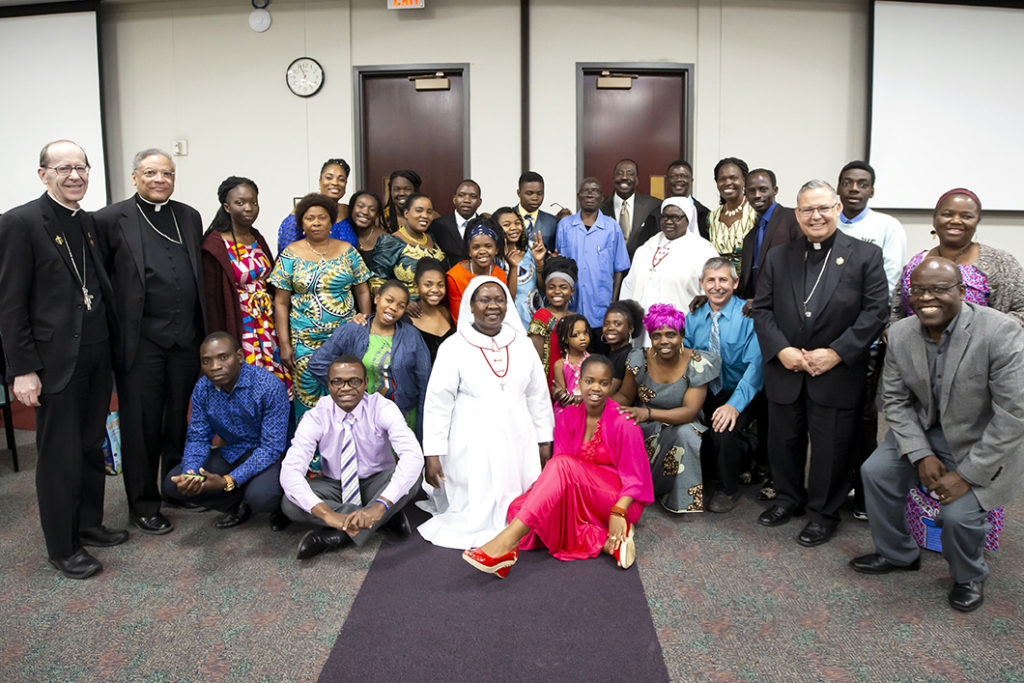

The solution to prejudice is to see each other as a child of God, Bishop Joseph N. Perry told a multiracial congregation at the annual Martin Luther King, Jr., Mass Jan. 21 at St. Mary’s Basilica.
“It’s easy to paint people in groups. Take them one at a time, it becomes a totally different matter,” said Bishop Perry. “We can have our racial, social and religious prejudice, or we can have Jesus Christ. But we cannot have both. The two are mutually exclusive.”
Bishop Perry, an auxiliary bishop for the Archdiocese of Chicago, is also the postulator for the cause of canonization for Servant of God Fr. Augustus Tolton, the first recognized black priest in the United States. The bishop visited the diocese for several days at the invitation of the diocese’s Office of Black Catholic Ministry, attending a performance of “Tolton,” a biographical play on Fr. Tolton, concelebrated the monthly Unity Mass for African American Catholics and preached at the MLK Mass.

In his homily, Bishop Perry reflected on “Open Wide Our Hearts,” the new pastoral letter on racism issued by the U.S. Conference of Catholic Bishops.
“The bishops … describe racism as one particularly destructive and persistent form of evil and felt we had to again remind the faithful that none of what has occurred recently in the nation is welcome in the Christian community nor are any of those incidents representative of the true spirit of this nation,” he said, referring to mass murders in recent years at a black church in South Carolina and a synagogue in Pittsburgh.
The bishop shared that he was a college seminarian when civil rights activist Martin Luther King, a Baptist minister, was assassinated.
“It took this Baptist preacher, like a contemporary prophet, to awaken consciences to carry forth God’s will for justice and the elimination of all racial and ethnic prejudice,” Bishop Perry said. “Our individual and national vocation implies a daily response to that call. And in so doing, Martin Luther King pressed for humanity to be applied to black people and numbers of others on the margins with his own witness of Christ in his life.”

Referring to King as a “remarkable human being,” Bishop Perry noted that his message had a universal reach and was a model for preachers and ministers in calling Christians to be better followers of Christ.
The bishop then reflected on the call of Nathaniel, or Bartholomew, to be an apostle of Jesus, noting the Gospel passage has a lesson about prejudice. When invited to follow Jesus, a Nazarene, his response was, “What good can come out of that place?”
“Nathaniel apparently harbored a popular distrust and dislike for Galileans, and anyone from Nazareth, in particular,” Bishop Perry said of the namesake for his middle name. “He gathered up the entire population in one bundle of contempt and refused to believe anything good about anyone who came out of that town. … There’s nothing rational or reasonable about prejudice. It just takes a group of people and lumps them all together.”
Prejudice, Bishop Perry said, almost cost Nathaniel the opportunity to know Christ. The answer, he said, was what Phillip the Apostle told Nathaniel: “Come and see for yourself.”

Justin Skinner, a 19-year-old parishioner from St. Mark who served the Mass, said that King’s legacy is alive and well.
“Thanks to him, I’m able to get an education that I rightfully deserve,” Skinner said. “With recent events transpiring, I think people are just trying to divide, when we should be trying to come back together. We need to re-find faith in God and then find a way to serve Him.”
The liturgy was particularly impactful for Shirley Norman, who had marched with King when he visited Detroit.
“He let everyone know, any race, any creed, any color, that we’re all God’s children, and that we’re all supposed to love one another as ourselves,” said Norman. “That’s something most people don’t practice.”
Though Norman is Pentecostal, she attends Catholic Mass with her sister at St. Raphael in Glendale when she visits for the winter, and said she appreciated Bishop Perry’s homily.
“There’s a lot of prejudice still in the world and it is rearing its ugly head now,” she said. The bishop’s “meaning was to let us know was that it’s still alive. It never died and doesn’t seem like it’s going to ever until we come to the grips that we’re all God’s children.”

Check out the St. James African choir providing the music for the #MLK Mass. pic.twitter.com/OsEF45CA4q
— The Catholic Sun (@thecatholicsun) January 22, 2019
Betty Nappe, a white parishioner at Blessed Sacrament in Scottsdale, said she remembers King while she was raising her children.
“I thought he was a wonderful speaker,” she said. “He seemed to really try to bring about peace and love.
George Okumu, a member of the African choir from St. James the Greater Parish in Glendale that provided the music for the Mass, said that King’s legacy is constantly prodding our consciences.
“The issues that he spoke about are as relevant now as they were then. Even though we resolve issues they may continue to be relevant for years to come,” Okumu said. “His legacy is always jogging our conscience to make sure we remember that the work is not done yet; the work continues.”





